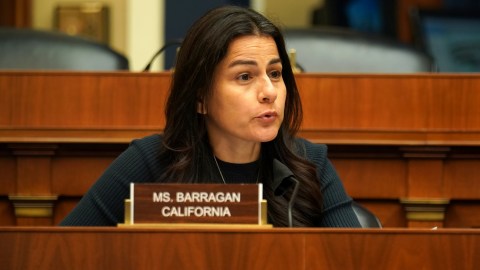Little Boys Can Cry: How We Address Latino Youth Mental Health in America
Latino youth are still face a mental health crisis in America given the stigma and the lack of access to providers. Recent studies show that Latino youth are far more likely than their peers to suffer from mental health problems such as depression, anxiety, and suicidal ideation

Congresswoman Nanette Diaz Barragán, Chair of the Congressional Hispanic Caucus. Crédito: Getty Images
Growing up in a Latino community, I remember the common phrases ‘los nenes no lloran’ (little boys don’t cry) and how because of all our sacrifices we had to ‘stay strong’ and ‘keep going’. Mental health was not on the list of priorities, and nobody ever fully discussed it. It was like our struggles had to be kept a secret.
Progress has been made to normalize conversations around mental health and seeking help, but Latino youth are still face a mental health crisis in America given the stigma and the lack of access to providers. Recent studies show that Latino youth are far more likely than their peers to suffer from mental health problems such as depression, anxiety, and suicidal ideation. According to the Salud America! Mental Health & Latino Kids report, fewer than 8% of Latino youth with a mental health condition receive treatment.
The Hispanic/Latino population is the largest minority group in the United States, with over 62 million people. Latino youth make up a significant portion of this population, and they face unique challenges that can contribute to mental health issues. Many Latino youth are first-generation Americans or immigrants, and they often face the pressures of balancing their cultural heritage with the expectations of their peers and communities. Additionally, many Latino families face economic challenges and lack access to quality healthcare, which can worsen mental health issues. On top of that, the COVID-19 pandemic has only increased these challenges.
President Biden and the Congressional Hispanic Caucus have worked tirelessly not only to protect access to mental health care but to build upon it. As part of the fiscal year 2023 government funding package, we passed the Restoring Hope for Mental Health and Well-Being Act, which strengthens and expands more than 30 critical programs that collectively support mental health care and substance use disorder prevention, care, treatment, and recovery support services in communities across the nation. Thanks to this bill, increased funding will support efforts right here in California to develop much needed early intervention systems to supports the mental health of children and young people and invest in the integration of behavioral health into pediatric primary care. Another bill we passed, and that President Biden made into law, the Safer Communities Act makes massive investments in mental health in schools in California and across the country.
We cannot take on the Latino youth mental health crisis alone – the whole community is needed. We need the support and partnership of Latino-led organizations, mental health professionals, and community leaders. Most importantly, as a community, we need to speak out about the importance of mental health care and destigmatize looking for help. Getting the care needed does not make anybody weak, but in fact stronger.
We need to have these conversations about mental health needs with each other and with our loved ones – now. Together, we can make progress in addressing the Latino youth mental health crisis and ensure that every young person can live a healthy, fulfilling life.
(*) Congresswoman Nanette Barragan is the Chair for the Congressional Hispanic Caucus (CHC)




